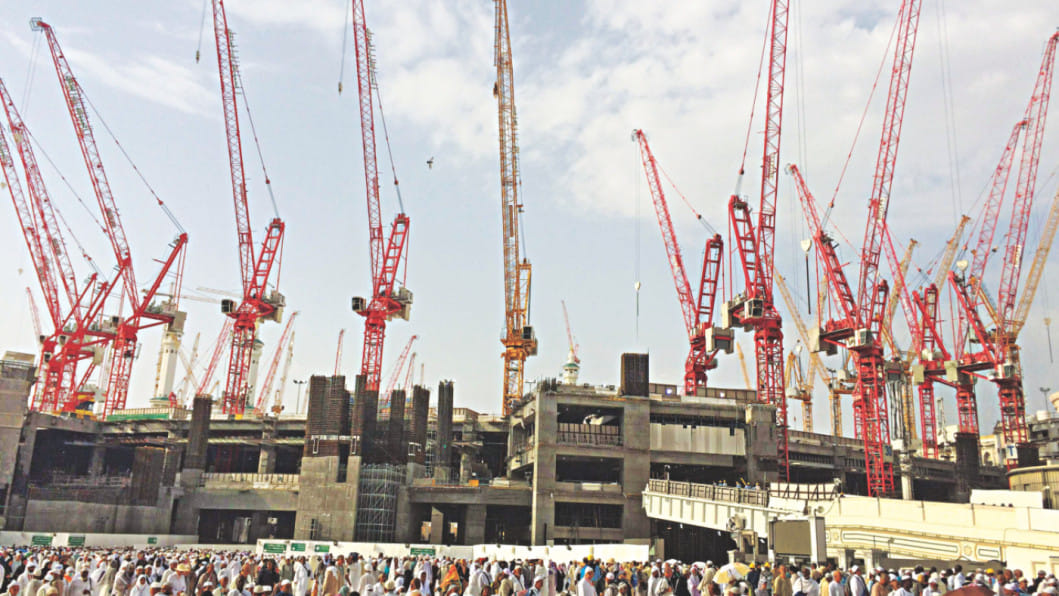Hajj to go ahead

This year's hajj pilgrimage will go ahead despite a crane collapse that killed 107 people at Makkah's Grand Mosque, said a Saudi official.
"It definitely will not affect the hajj this season, and the affected part will probably be fixed in a few days," said the official, who declined to be named.
Hundreds of thousands of pilgrims had already arrived in Makkah for the annual pilgrimage expected to start on September 21.
Parts of the Grand Mosque, one of Islam's holiest sites, remained sealed off yesterday around the toppled crane, which also injured around 238 people when it fell into a courtyard.
The nationalities of the dead and injured pilgrims are yet to be announced, reports Saudi Gazette. Consuls general of India, Pakistan and Bangladesh told the daily that so far there were no confirmed reports of death among their pilgrims.
Indonesians and Indians were among those killed, while the injured included Malaysians, Egyptians and Iranians, AFP writes.
So far, no Bangladeshi has been reported dead in the incident, Bangladesh Ambassador to Saudi Arabia Golam Moshi told The Daily Star last night.
The foreign ministry also issued a press release saying there has been no report of death of any Bangladeshi -- pilgrim or worker -- in the disaster.
In reply to a question, Golam Moshi, however, said, "Our officials are at the mortuary and we will come to know if any Bangladeshi is among the dead."
The incident left at least 40 Bangladeshis injured and they were hospitalised, mostly with minor injuries. Most of them were hurt in stampede after the incident, according the ministry press release.
Nizamuddin, a pilgrim from Chandanaish of Chittagong, was undergoing treatment yesterday for head injuries and he has to stay at hospital for a few more days. The rest of the inured were released after primary treatment, the envoy said.
Meanwhile, Prime Minister Sheikh Hasina sent a condolence message to King of Saudi Arabia Salman bin Abdulaziz Al Saud, expressing her deep sympathy for victims and their family members.
The foreign minister also sent a message to his Saudi counterpart.
Yesterday, sympathy and tributes were offered by people from around the world. Saudi Arabia received condolences from Arab leaders as well as from Britain, Canada, India and Nigeria.
This was not the first tragedy to strike Makkah pilgrims, though the hajj has been nearly incident-free in recent years.
In 2006, several hundred died in a stampede during the Stoning of the Devil ritual in nearby Mina, following a similar incident two years earlier.
Friday's accident took place as the Grand Mosque prepared to welcome the millions of pilgrims who will gather there later this month for Islam's annual Hajj pilgrimage, one of the largest religious gatherings in the world.
The crane struck a third floor area on the eastern side of the Grand Mosque around 5.45pm, while the building was packed with the 6.30pm Friday prayers approaching. The crane's arm crashed into the top edge of the building and, crumpling under its own weight, the top section smashed down into the roof.
Several cranes surround the mosque to support an ongoing expansion and other construction work that has transformed the area around the sanctuary.
The $60 billion redevelopment is being carried out by the Saudi Binladin Group - owned by Osama Bin Laden's family.
The huge complex covers more than 88 acres and includes indoor and outdoor prayer areas. It is open 24-hours a day.
Steep hills and low-rise traditional buildings that once surrounded the mosque have in recent years given way to shopping malls and luxury hotels -- among them the world's third-tallest building, a giant clock tower that is the centrepiece of the Abraj al-Bait complex.
The Binladin family, which also built the Abraj al-Bait project, has been close to the ruling Al Saud family for decades and oversees major building projects around the country, writes Independent.co.uk.

 For all latest news, follow The Daily Star's Google News channel.
For all latest news, follow The Daily Star's Google News channel. 



Comments